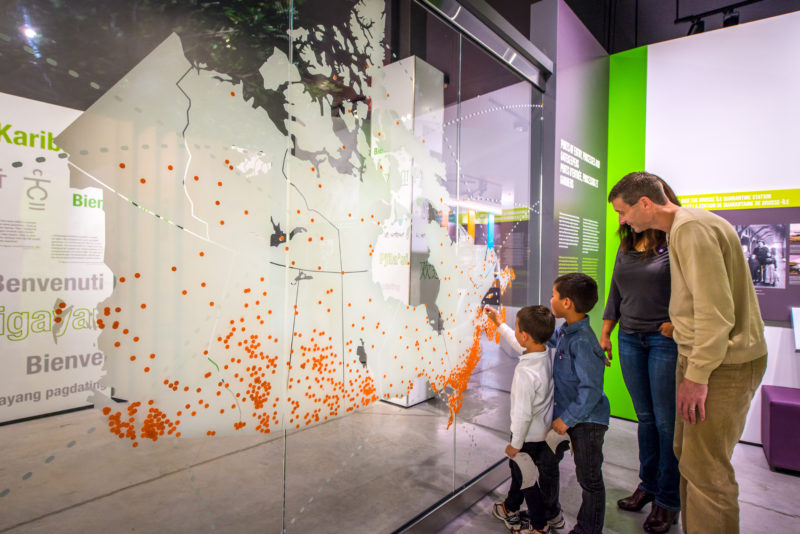Immigration is changing the fabric of Nova Scotia. For the last few decades, it's been increasing the diversity and innovation in workplaces, universities and communities.
Immigrants are important drivers of economic and population growth, and Nova Scotians play roles in supporting them.
“Immigration requires a commitment from everybody,” says Minister of Immigration, Lena Metlege Diab. “It’s not only the government’s responsibility.”
“All our partners, employers and local chambers of commerce ensure Nova Scotia is attracting the talent and the people but also supporting immigrants in building their lives and their families’ lives here.”
The 2013 Ivany Report has set an immigration goal for Nova Scotia to receive its proportionate annual share of all new international immigrants to Canada.
That number is about 7,000 new permanent residents per year (2.7% share). Nova Scotia surpassed that goal in 2019 when it welcomed 7,580 new immigrants.
“Immigration has really flourished in our province over the past five to 10 years, and it's been wonderful to see the increasing numbers,” says Jennifer Watts, CEO of Immigrant Services Association of Nova Scotia (ISANS).
Although the 2020 goal will most probably not be attainable due to the pandemic, the Nova Scotia Office of Immigration never ceased processing immigrants into Canada.
“Since the pandemic, there has been a drop in the number of people entering the country,” says Watts. “But people who were overseas and have their permanent residence status were still able to arrive and come into the country.”
“We focused on processing individuals who are either currently working in the province, are essential services during the pandemic, or people with expiring work permits to try and help them continue to be in status,” says Minister Metlege Diab.
“I'm very proud of the fact that we've continued to process applications,” she says. “We never stopped, not even for one day, not even when the office physically closed its doors.”
The challenge right now is helping immigrants land from overseas. With the international borders somewhat closed, there’s a need for balance between safety and allowing passage to immigrants – if they’re essential.

“It's a huge commitment on the part of people to see those numbers get back up again, bring people in a safe manner, have them feel supported, welcomed and integrated into the job market and our community,” says Watts.
“And we're confident that our federal colleagues are working to allow newcomers in,” says Minister Metlege Diab.
Immigration has been a priority from day one for Minister Metlege Diab when she took office in 2013. Nova Scotia continued, since that date, to be innovative and make changes to adapt to immigration needs.
“When I stepped in, the office was largely sort of a processing center,” says Minister Metlege Diab. “We had to restructure to make it more engaging and innovative with dynamic teams and have individuals who can work in international marketing, policy, communications and programming.”
The Nova Scotia Office of Immigration launched a new immigration website in 2014 to provide timely and relevant information to potential applicants, like international students, employers and newcomers who were overseas.
“We worked extremely hard to change people’s behaviours and attitudes towards immigrants and their benefits to Nova Scotia,” says Minister Metlege Diab.
With that passionate, gung-ho attitude and 22 years practicing law before stepping into politics, Minister Metlege Diab and the Office of Immigration were able to get Nova Scotia recognized in 2015 as a national leader in adopting the Federal Express Entry System.
“We were the first jurisdiction in Canada to actually adopt it,” says Minister Metlege Diab.
Realizing at that time many students were not able to open their own businesses and acknowledging the lack of succession planning in the province,
the Nova Scotia Office of Immigration launched two new immigration streams.
The new business immigration and international graduate entrepreneur streams attract international entrepreneurs and retain international graduates of provincial post-secondary institutions.
Both streams are geared towards succession planning for immigrants to buy businesses and continue generating revenues.
“We’ve continued to experience growth in our programs, and we have been exceeding allocations every year since 2013,” says Minister Metlege Diab.
“Our retention numbers had remained strong – we are the highest in the Atlantic region. And our landing numbers are the highest ever.”
The province’s support for retaining international graduates has increased to 605 applications in 2019 from 35 in 2014.
The Atlantic Immigration Pilot Project, launched in 2017, offered a new form of support for immigration in Canada. Employer-driven, it helps support employers in filling their skilled labour market needs through immigration.
“We've seen the growth of pride of refugee sponsors, particularly during the hiring initiative,” says Watts. “It's a strong message about how Nova Scotians respond. And it’s a very strong humanitarian and welcoming attitude towards reaching out, supporting people coming from very difficult situations and helping them settle here in our community.”
This past January, just before the pandemic, the Organization of Economic Cooperation and Development (OECD) in Paris, France invited Minister Metlege Diab. She was the only Canadian representative to speak to the organization.
“We've been recognized internationally as a welcoming destination for workers and their families who have the skillsets we need,” she says.
Immigration has been and continues to be key to economic and population growth. With our region’s aging population, it will be instrumental in aiding the province with economic recovery, particularly post-pandemic.

In response, the Nova Scotia Office of Immigration continues to support the delivery of essential services in sectors like health care and public transit.
“There continues to be a need for skills to meet the labor market shortages identified by sectors and employers, and we're going to continue to monitor the labour market and explore how our programs and services can help meet these challenges,” says Minister Metlege Diab.
“The important thing to realize, which has come to the forefront during the pandemic, is how essential refugees are as frontline workers,” says Watts.
“Some people who are nurses and doctors, working at nursing homes, driving transit buses and providing very key essential services to us are immigrants,” she say. “They make a huge contribution to our ability to move through the pandemic; they will be a huge part of the future and certainly will be a very strong contribution to our economic recovery.”
In order to meet the high demand for essential workers and to secure the future of our province, additional support for immigrants is needed.
“We've had settlement services responding in practical ways to helping newcomers build their skills,” says Watts.
“For example, the Bridge to Work Program helped link immigrants who may not have strong language skills but have good work skills to be able to practice and effectively move into an employment situation.”
“It’s actually very positive and important both for the employee and the employer and, in the larger picture, for our local economy,” she says.
“Immigrants bring innovation, new ideas, global perspectives and help everyone economically and also socially,” says Minister Metlege Diab.
“People are becoming more accepting,” she says. “They now understand that immigration is key to our economic success.”
Immigration is not only an economic priority for the province, but it’s also a social support system for foreigners who are looking for a new home and opportunities.
To secure immigration for the future, ISANS has implemented pre-arrival programs. They provide support for people waiting to emigrate to Nova Scotia and who may be unable to travel at this point in time.
“Whenever we have a year like this, it really takes a huge opportunity away from us: a huge wonderful pool of people that can come to our communities and do all the wonderful things that they do,” says Watts.
The programs offer counseling, understanding of the labour markets and access to courses to help skilled immigrants integrate into the workplace.
“We have some amazing stories of people who were able to fast track their ability to find employment and integrate rapidly because they've done this pre-arrival work,” says Watts.
“Immigrants now not only can be proud of their heritage, their background and their culture, but they can also be proud of being Nova Scotian Canadians and for contributing to the diverse fabric of this land. And that makes me extremely proud,” says Minister Metlege Diab.
Pre-arrival programs also provide background information on the COVID-19 situation in Canada and Nova Scotia. That way, they know what to expect when they arrive and what their responsibilities and obligations will be like.
“It's an opportunity to really help them think about the process, arrive well prepared at this stage and keep the community around them safe,” says Watts.
“We need to understand our role as a wider community in welcoming, learning from and supporting immigrants as they take this huge step forward to settling into a new country,” says Watts.
“Our economy will also be strengthened, and our communities will benefit a lot from immigrants.”
“So we're going to continue to build on the success we've achieved for the last seven years,” says Minister Metlege Diab. “And we look forward to future growth.” ■

< Back to Articles | Topics: Immigration

